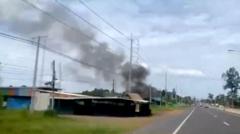Recent clashes between Thai and Cambodian troops at their border have left at least 15 people dead, reflecting strained relations exacerbated by a leaked conversation between leaders. This incident highlights the fragile political landscape in both nations, the long-standing historical tension, and the potential for escalation in a region where economic and military stakes are high.
Tensions Escalate at Thailand-Cambodia Border Amid Political Fallout

Tensions Escalate at Thailand-Cambodia Border Amid Political Fallout
A border conflict between Thailand and Cambodia intensifies, claiming civilian lives and revealing deep political rifts.
Recent clashes at the Thailand-Cambodia border have escalated into a significant conflict, leaving at least 15 people dead, mostly civilians. This situation comes against a backdrop of deteriorating diplomatic relations between the two countries, sparked by a leaked phone call involving Thai Prime Minister Paetongtarn Shinawatra and Cambodian leader Hun Sen.
Historically, the Thailand-Cambodia border has been a flashpoint of tension, with past conflicts resulting in casualties, prompting both nations to seek de-escalation. Following earlier incidents, including the death of a Cambodian soldier, military leaders from both sides had engaged in talks aimed at preventing further violence. However, the recent skirmish was ignited by a landmine explosion that injured five Thai soldiers.
The diplomatic spat began when Hun Sen leaked a private call in which Paetongtarn affectionately referred to him as "uncle," intertwined with criticisms of her military's handling of border issues. This breach of trust has further strained relations between their families, rooted in historical ties that date back decades when former Prime Minister Thaksin Shinawatra’s government interacted closely with Cambodia.
In the aftermath of the leaks, many criticized Paetongtarn, leading to her suspension and raising questions about her political future. With both nations experiencing leadership crises — Thailand grappling with economic stagnation and Cambodia led by an inexperienced prime minister — neither seems willing to back down. Hun Sen has taken the opportunity to amplify his anti-Thailand rhetoric, suggesting he possesses incriminating documents against Thaksin.
As the violence continues, the prospects for bilateral trade, previously worth billions, have dimmed, mirroring the political entanglements that often obscure the path to resolution. The military tensions are now compounded by fears of retaliatory actions, as Thailand has expelled the Cambodian ambassador and recalled its envoy, signaling a willingness to confront the conflict head-on.
Asean's role in mediating this clash will be crucial. Historically designed to foster cooperation and prevent disputes among member nations, it faces a pressing need to address this crisis that threatens regional stability. The unfolding situation at the border raises critical questions: Was Hun Sen's action a calculated move to consolidate power, or a response to broader economic pressures facing both nations?
As political figures in both countries continue to grapple with their fragile circumstances and the complexities of foreign influence, the path to peace remains uncertain, underscoring the volatile intersection of politics and pride in Southeast Asia.


















